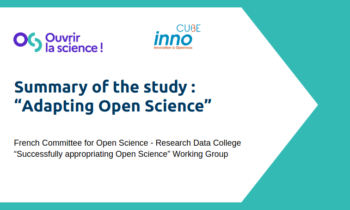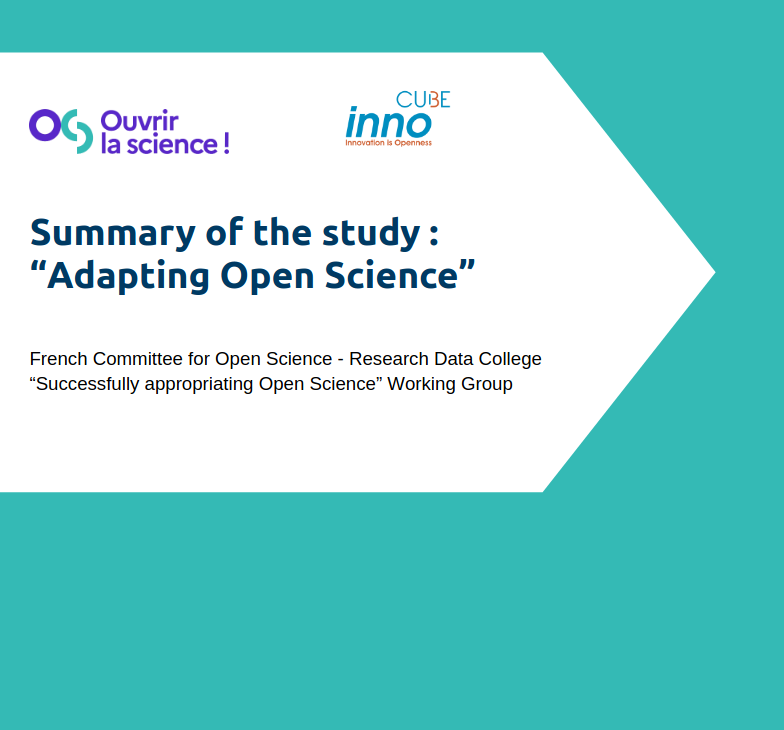
Publication of the ‘Adapting Open Science’ report
At the end of 2022, the Open Science Committee published the report ‘Adapting Open Science’ (or Adapting-SO), the result of a study coordinated by Inno3 (Célya Gruson-Daniel was responsible for coordination).
The study is part of the ‘Making a success of the appropriation of open science project, carried out by the Research Data College of the French Open Science Committee.
The Adapting-SO study, a summary of which has just been published on HAL, ran from May 2020 to December 2021.
As part of the ‘Making a success of the appropriation of open science’ mission led by the Research Data College, one of the areas of work consisted of defining open science by addressing two issues: What factors should be taken into consideration to better understand the diversity of practices associated with research data? How can we support the development of data-related practices in relation to the incentives/obligations provided by ‘open science’ public policies? The study is based on a methodology that combines a qualitative and quantitative approach, through an exploratory survey and observation of practices followed by a questionnaire. The findings show that the differences between practices associated with data depend not only on the disciplines involved, but also on the research approach, the tools and training used, and the status and role of the stakeholders concerned. Support must therefore take these differences into account. The recommendations resulting from the analysis of the results focus on various aspects, such as the importance of differentiated approaches, respect for a culture of independence, vigilance with regard to the interoperability and transparency of tools, and the need for support.
Abstract of the report
Moving away from a purely disciplinary approach, the aim of this field study was to understand, analyse and report on the practices of research professionals in dealing with data.
During this study, researchers from a wide range of disciplines were interviewed to :
- gain a better understanding of the practices associated with data and how they are evolving with open science,
- understand the factors that differentiate these practices (discipline, research approach, etc.),
- provide support tailored to the needs of different research communities.
Methods
To do this, the Adapting Open Science study used a mixed approach, in other words, a combination of quantitative and qualitative methods:
- interviews (qualitative),
- organisation and supervision of a study day (qualitative),
- setting up focus groups,
- distribution of a ‘Data and Open Science’ questionnaire (quantitative).
In addition to these mixed methods, a design approach was also applied to facilitate the appropriation of the results (construction of personae, visualisation via heatmaps, publishing, etc.).
Results
Four ‘typical’ profiles were established through a quantitative analysis of the questionnaire. These profiles are as follows :
- Experimental: associated with people mainly from the life and material sciences,
- Collaborative: corresponding to people who use collective practices at different stages of their research, or at least wish to learn about them,
- Solitary: includes individuals who carry out their research alone, although this is not necessarily desired due to their status or working conditions, for example in the case of a doctorate,
- Computational: brings together individuals from different disciplines (from computer science to linguistics) but who share a common culture of data and often a knowledge of free and open source software.
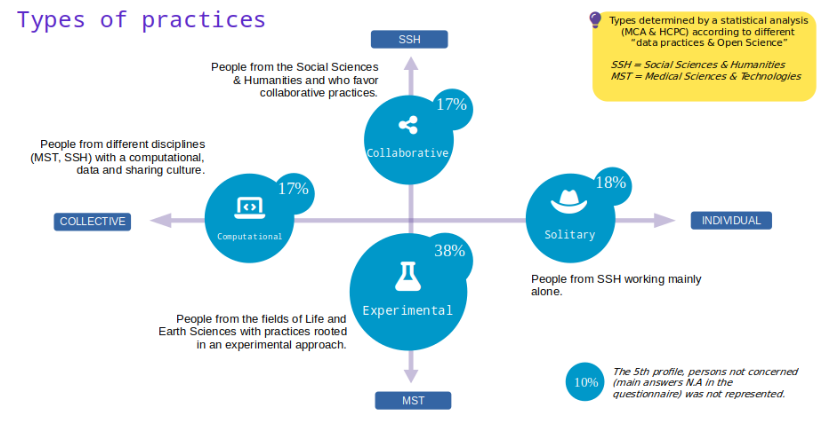
from the analysis of the questionnair
On the basis of these 4 profiles and the qualitative analysis, the team came up with 8 personae (fictional characters) reflecting the data-related practices shared by certain research professionals and making it possible to embody a diversity of data-related practices.
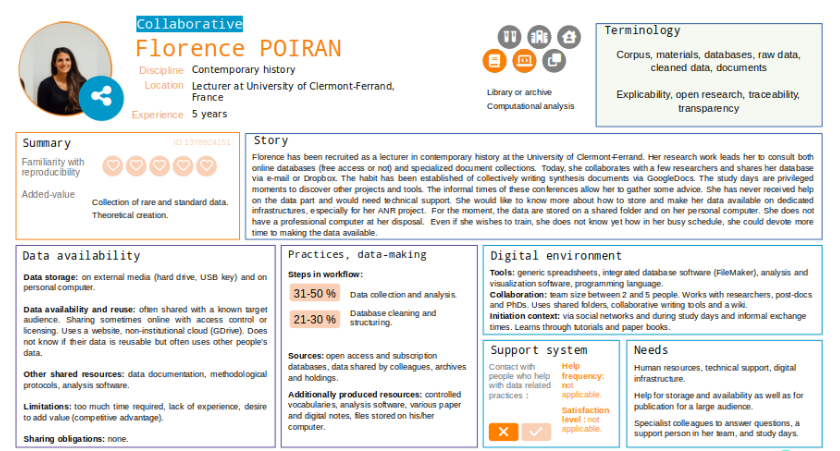
The findings of this study show that the factors differentiating the various practices associated with data do not stop at the disciplinary boundary. Other factors come into play, such as :
- the individual or collective approach to the work
- the research approach (such as the working environment, criteria relating to the quality of research, the relationship with data in general, etc.),
- the tools made available and the learning methods relating to these tools,
- the status and/or position within the laboratory (doctoral student, permanent staff member, associate researcher).
Key takeaways
20 points of attention have also been drafted to help the various research communities and the people in charge of open science in the institutions to better understand and distinguish a diversity of practices in order to best adapt the support to be provided. These 20 points of attention have been arranged into the following 5 guidelines:
- Gain a more detailed understanding of research approaches (terms used to qualify data, criteria associated with research quality, the value of the work, etc.),
- Understand the different ways in which data is made available (re-use of data, limits to making data available, data storage and security issues, etc.),
- Learn about learning methods and collaborative practices (training in tools, attention to interfaces, etc.),
- Diversify the types of support (different needs identified, mediation issues within teams, etc.),
- Take into account status and career issues.
Editorial work on the report
In addition to this publication, the study was the subject of a research project on the publishing and promotion of results as part of an open science approach (carried out by Tamara Glushetckaia during her Master 2 Digital Humanity internship with the firm).
This resulted in the creation of a website on the PubPub open source publishing platform (only available in French).
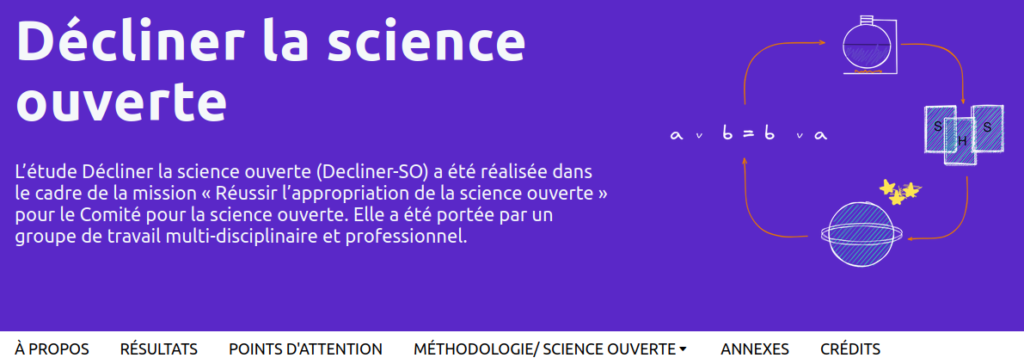
The various editorial works are part of a broader vision of open science, which consists of :
- Facilitating access to documents:
- free access to the content produced, using licences (Creative Commons, open source, open data),
- opening up data and scripts to enable the study to be reproduced,
- writing a data management plan,
- Consideration of the appropriation of content:
- design work to make it easier to understand the results and the approach,
- editorial content on the PubPub platform for greater interactivity with the content and the possibility of adding comments.
- Transparency of the research process through work on:
- the reproducibility of qualitative analysis through the creation of a jupyter notebook and access to data,
- traceability of qualitative reasoning, making visible the various stages of qualitative coding, hypothesis-building and theorising (anchored theorisation analysis method).
Acknowledgements
Inno³ would like to thank the entire team involved in this study: Anne VANET (WG Leader, University Professor, Vice-President of Open Science at the University of Paris), Hélène CHAMBEFORT (Head of Archives at INSERM), Marie HERBET (Library Curator at the University of Lyon 1), Juliette HUEBER (InVisu CNRS/INHA Research Engineer) and Claire LEMERCIER (CNRS Research Director at the CSO SciencePo).
Inno³ would also like to thank all the people who gave their time and interest to this study, whether by taking part in the study day on ‘from the field to data in social sciences and humanities’, the qualitative interviews or by responding to the ‘data and open science’ questionnaire.
References
- Synthesis in french (DOI : 10.52949/28) and in english (DOI : 10.52949/29) on HAL
- Final report in the form of a presentation with annexes (interview frames, questionnaire and data management plan) is available on HAL (DOI : 10.52949/27)
- Data from the questionnaire are available on Recherche.data.gouv (DOI : 10.57745/V64RYT)
- The scripts required for reproducible analysis of the questionnaire and a methodological note are available on Gitlab
Organisation involved
Ministry of higher education and research (France)
